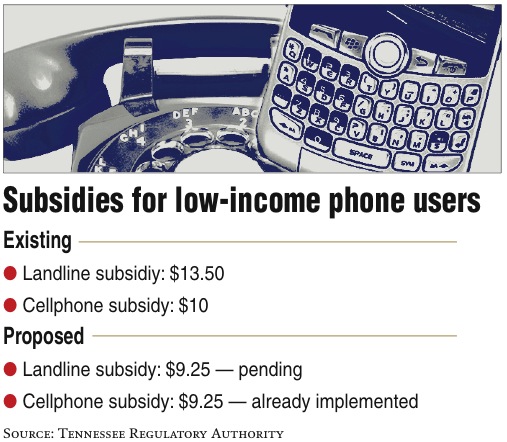Difference between federal and state Lifeline programs:• Federal -- The Federal Lifeline program provides a discount for both landline and wireless telephone service for eligible consumers. The FCC reimburses providers of discounted voice service, including telephone companies and wireless providers.• State -- When it was originally established, the Federal Lifeline program provided a larger discount if state commissions created a matching program. Most states created an additional state Lifeline discount to get the maximum federal match.Source: AT&TChange in phone subsidies• State: $3.50, carriers pay out of pocket, for landlines only.• Federal: $10, reimbursed by federal government, can go toward cell phones.Proposed subsidies• State: $0, reduction pending.• Federal: $9.25, reduction already implemented.Who's affected in Tennessee?• Eligible for Lifeline program: 625,162• Enrolled in Lifeline program: 406,500• Cell-phone users: 313,000*• Landline users: 93,687• Not affected by state subsidy cutsSource: Tennessee Regulatory Authority, Office of the Attorney General
A telephone industry group led by AT&T wants to eliminate a $3.50 subsidy for low-income landline subscribers, calling the discount outdated, anti-competitive and discriminatory.
The push to end the state landline subsidy comes after the federal government chopped its own monthly payout to low-income phone users to $9.25 from $10, and also cut incentives to states that support the federal program.
If the state subsidy is eliminated, low-income cellphone and landline users still would receive the $9.25 federal discount.
But consumer advocates say that the proposal comes at the worst possible time for hundreds of thousands of Tennessee families for whom the landline subsidy could be their only way to call 911.
"People who depend on AT&T's Lifeline program could be cut off from contact with their loved ones, with emergency services, or even from basic services like making doctor's appointments," said Rebecca Kelly, state director for AARP. "In short, they may face complete isolation from our communities."
That's taking it a bit too far, said Larry Drake, executive director for the Tennessee Telecommunications Association.
"I think the AARP is wrong," Drake said. "I can't see my mother being worried about $3.50."
AT&T's Chattanooga plans range from $21 for the most basic phone service to $50 or more for extra features and long-distance calling, according to sales personnel.
The telecommunications coalition first petitioned the Tennessee Regulatory Authority in early May to do away with state Lifeline credit for about 93,687 low-income Tennessee households who use landlines.
They say the move would save AT&T's landline business more than $327,900, which the telecommunications giant must pay out of its own pocket -- unlike federal programs that are taxpayer-supported.
AT&T said in its filing that the state Lifeline program imposes costs and administrative burdens on landline providers that are not required of wireless, cable and voice over Internet Protocol, or VoIP, competitors.
"As of July, when the federal rule changes take effect, Tennessee will be one of only three states that does not allow telephone companies to be reimbursed in any way for providing the mandated state discount," said Chris Walker, a spokesman for AT&T.
The federal Lifeline program was created in the 1980s, in the wake of the 1984 antitrust breakup of the old AT&T. The federal government agreed to offer a larger discount if states created matching programs.
Tennessee jumped on the bandwagon and mandated discounts for low-income consumers but didn't set aside money to repay AT&T, which at that time was a state monopoly.
"Tennessee's state Lifeline discount is an unfunded mandate that only applies to landline telephone companies," Walker said.
When competition in the state telecommunications market was legalized, AT&T was no longer the only game in town.
AT&T said the subsidy is now irrelevant and unfair because it's the only one that must pay it as hundreds of thousands of customers cut the landline cord each year in favor of cellphones. The company said the subsidy soaks up dollars that it could use to extend and improve its landline business.
But the state Attorney General's Consumer Advocate and Protection Division opposes the move.
"Given the economic challenges many Tennessee households face and growth in the demand for Lifeline program, we are concerned that eliminating the State Lifeline credit would not be in the public interest," Tennessee Attorney General Robert Cooper wrote to the Tennessee Regulatory Authority.
Eliminating the state Lifeline program could hurt the 625,162 households that are eligible for the discount, at a time when the floundering economy has amplified the need for relief, he said.
Enrollment in both the state and federal programs has surged to 406,500 in 2011 from 64,000 in 2007 "during a period of severe economic challenges and a struggling job market," Cooper wrote.
While overall landline use has declined, the number of Tennesseans in the landline Lifeline program has doubled in the past five years, according to publicly available documents.
However, the program grew primarily from the addition of wireless customers, not from landlines, both sides admit. Of the 406,500 Lifeline recipients in Tennessee, nearly 313,000 are cellphone customers who do not receive a state discount.
"The vast majority of Lifeline customers in Tennessee will see no change, since nearly 80 percent are wireless and do not receive a state discount," said Walker. "Both wireless and landline Lifeline customers will continue to receive the federal $9.25 per month discount."
Contact staff writer Ellis Smith at esmith@timesfree press.com or 423-757-6315.


